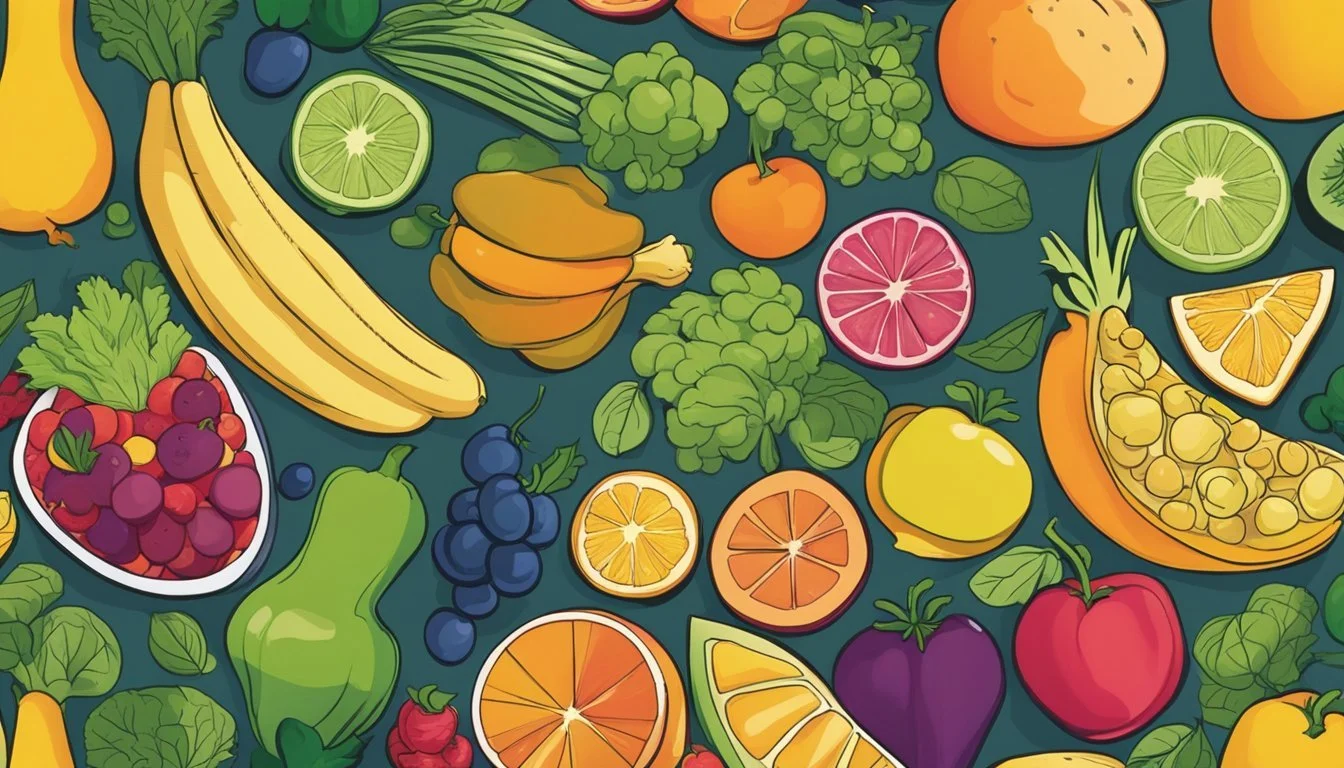Vision-Boosting Foods: Nourish Your Eyes for Better Sight
Maintaining good vision relies significantly on the nutrients we consume through our daily diet. Certain foods are particularly beneficial for eye health, providing essential vitamins and minerals that support vision and prevent common eye conditions. Understanding the specific nutrients that play a role in promoting eye health can help individuals make informed dietary choices.
Incorporating a variety of nutrient-dense foods into your diet can enhance eye health and protect against vision problems. From dark leafy greens to oily fish, the right food choices can make a meaningful impact on maintaining clear and healthy eyesight. This article explores the foods that are proven to support and improve eye vision.
1) Carrots
Carrots are widely acknowledged for their positive effects on eye health. They are rich in beta-carotene, a compound that the body converts into vitamin A. This nutrient plays a vital role in maintaining proper vision.
Vitamin A helps produce rhodopsin, a light-sensitive pigment in the retina. Rhodopsin is crucial for seeing in low light conditions. A deficiency in vitamin A can lead to night blindness, highlighting the importance of this nutrient.
Carrots also contain antioxidants, which help protect the eyes from oxidative stress and reduce the risk of certain eye diseases. Including carrots in a balanced diet can contribute to maintaining eye health.
Easily incorporated into meals, carrots can be eaten raw, cooked, or juiced. This versatility makes it simple to benefit from their eye health properties.
2) Spinach
Spinach is a highly nutritious leafy green vegetable that can significantly benefit eye health. Rich in antioxidants such as lutein and zeaxanthin, it helps protect the eyes from damage caused by free radicals.
These antioxidants play a crucial role in maintaining healthy vision. They aid in filtering harmful high-energy light waves, thus preventing macular degeneration and cataracts.
Spinach is also a good source of vitamins C and E, which further support eye health. These vitamins help protect eye cells from damage and reduce the risk of eye diseases.
Including spinach in a diet is easy. It can be added to salads, smoothies, or cooked dishes, ensuring that these beneficial nutrients are part of the regular diet.
Considering its high nutritional value, incorporating spinach into meals is a simple and effective way to support and maintain eye health.
3) Sweet Potatoes
Sweet potatoes are a valuable food for eye health. They are rich in beta-carotene, which the body converts into vitamin A, a critical nutrient for vision. Vitamin A supports the retina's ability to process light, aiding in better vision and reducing the risk of night blindness.
Besides beta-carotene, sweet potatoes also contain antioxidants that protect the eyes from damage caused by free radicals. These antioxidants help in reducing the risk of age-related macular degeneration and cataracts.
Including sweet potatoes in the diet can be beneficial for maintaining moisture in the eyes. This prevents dry eye syndrome, a common condition that can cause discomfort and vision problems. The high vitamin A content in sweet potatoes helps keep the eyes lubricated.
Incorporating sweet potatoes into meals can be simple and versatile. They can be baked, mashed, or even blended into smoothies. This makes it easy to enjoy their benefits in various forms, whether as a main dish or a nutritious snack.
4) Blueberries
Blueberries contain high levels of antioxidants, particularly anthocyanins, which give them their deep blue color. These antioxidants help protect the eyes from oxidative stress, which can reduce the risk of age-related macular degeneration (AMD) and cataracts.
In addition to antioxidants, blueberries are rich in vitamins and minerals that support eye health. These include vitamin C, vitamin E, and zinc, which can help maintain the function and structural integrity of the eyes.
Studies suggest that anthocyanins found in blueberries may improve ocular blood flow and help manage intraocular pressure. This can be beneficial for individuals with conditions like glaucoma, as improved blood flow and pressure regulation are key factors in managing the disease.
Incorporating blueberries into daily meals can be both easy and enjoyable. They can be added to smoothies, salads, or even baked goods like muffins, providing a delicious way to boost eye health.
5) Almonds
Almonds are an excellent source of vitamin E, a nutrient known to protect eye cells from damage caused by free radicals. Regular consumption of almonds can enhance antioxidant defenses, potentially reducing the risk of age-related macular degeneration and cataracts.
These nuts are also rich in healthy fats, which support overall cellular health, including that of the eyes. A small handful of almonds daily can contribute significantly to meeting the recommended vitamin E intake.
Additionally, almonds contain other beneficial nutrients like omega-3 fatty acids and zinc, which further support eye health. Incorporating almonds into a balanced diet can be a simple and effective way to maintain healthy vision.
Plain or lightly salted almonds make for a convenient snack. They can also be added to salads, oatmeal, or yogurt for a nutritious boost.
By including almonds in daily meals or as a snack, individuals can easily take advantage of their eye-protective benefits.
6) Eggs
Eggs are an excellent choice for maintaining eye health, largely due to their rich nutrient profile.
The yolks contain high levels of vitamin A, lutein, and zeaxanthin. Vitamin A is crucial for vision as it safeguards the cornea—the eye's surface.
Lutein and zeaxanthin are powerful antioxidants. They are pivotal in reducing the risk of cataracts and age-related macular degeneration by filtering harmful high-energy light waves.
Studies indicate that moderate egg consumption, defined as two to four eggs per week, can significantly lower the risk of vision decline in older adults. This moderate intake is beneficial without increasing cholesterol levels appreciably.
Additionally, eggs are a great source of zinc. This mineral is necessary for the functioning of the retina, enhancing visual performance in low-light situations.
Selecting high-quality eggs from free-range or organic sources can provide even better nutrient content. This is due to the typically higher levels of omega-3 fatty acids found in these eggs.
Incorporating eggs into the diet can be simple and versatile. They can be boiled, scrambled, or added to salads, ensuring that one reaps their eye-health benefits regularly.
7) Fish (Salmon, Tuna)
Fish such as salmon and tuna are rich sources of omega-3 fatty acids, particularly DHA (docosahexaenoic acid). DHA is a crucial component of the retina, supporting overall vision and reducing oxidative damage.
Incorporating these fish into a diet can help reduce inflammation, support tear production, and maintain overall eye health. Regular consumption may lower the risk of age-related macular degeneration.
Salmon and tuna should be prepared by grilling or broiling to retain their nutritional value. These cooking methods also avoid adding unhealthy fats that could counteract the benefits.
Including fatty fish in meals twice a week is generally recommended to achieve these benefits.
8) Citrus Fruits (Oranges, Lemons)
Citrus fruits like oranges and lemons are rich in vitamin C. This vitamin is essential for maintaining the health of blood vessels in the eyes and can reduce the risk of cataracts and macular degeneration. Including these fruits in the diet can help protect long-term vision.
Oranges and lemons also contain antioxidants that combat oxidative stress. This stress can lead to damage in the eyes over time. Consuming these fruits regularly can help to mitigate this damage and support overall eye health.
Vitamin C from citrus fruits helps with the absorption of other antioxidants. This improves the overall defense mechanism of the eyes against damage caused by environmental factors and aging. Both oranges and lemons are easy to incorporate into daily meals, making them convenient choices for eye health.
9) Broccoli
Broccoli is a powerhouse of nutrients that benefit eye health. It is rich in vitamin C, an antioxidant that protects the eyes from harmful free radicals. One cup of raw broccoli provides nearly 90% of the daily recommended value of vitamin C.
This vegetable also contains lutein and zeaxanthin, which are carotenoids that help filter harmful blue light and maintain healthy cells in the eyes. Lutein and zeaxanthin are crucial for preventing age-related macular degeneration and cataracts.
Broccoli is also a good source of vitamin A, which is essential for good vision. Vitamin A helps maintain a clear cornea, which is the outside covering of the eye. It also supports the function of the retina, where vision is processed.
10) Sweet Corn
Sweet corn is a vibrant yellow vegetable packed with nutrients beneficial for eye health. It is particularly rich in lutein and zeaxanthin, two carotenoids that are essential for maintaining good vision and protecting the eyes from harmful blue light.
These antioxidants play a significant role in lowering the risk of age-related macular degeneration and cataracts. Including sweet corn in one's diet can enhance the intake of these vital compounds, supporting long-term ocular health.
Additionally, sweet corn provides a good source of vitamins C and E, both of which contribute to eye protection by combating oxidative stress. The presence of these vitamins further fortifies sweet corn's role in preserving vision.
Incorporating sweet corn into meals is not only beneficial but also versatile. It can be enjoyed in salads, soups, or as a standalone side dish, making it an easy addition to everyday diets.
The Connection Between Nutrition and Eye Health
A well-balanced diet is crucial for maintaining optimal eye health. Specific nutrients play key roles in protecting the eyes from various conditions and promoting good vision.
How Diet Affects Vision
The food one eats significantly affects eye health. Diets rich in green leafy vegetables, seafood, nuts, and colorful fruits can lower the risk of eye diseases.
For example, lutein and zeaxanthin, found in many vegetables, are essential for preventing cataracts and age-related macular degeneration (AMD).
Additionally, omega-3 fatty acids in fish like salmon and tuna support the structure of retinal cells. A diet low in these nutrients might contribute to vision impairments and increase the risk of eye conditions.
The Role of Antioxidants
Antioxidants are vital for eye health. Vitamins such as A, C, and E, along with minerals like zinc, protect the eyes from damaging free radicals.
Vitamin C, found in citrus fruits, and Vitamin E, present in nuts and seeds, help prevent cataracts. Zinc, found in oysters and beef, supports night vision and prevents age-related deterioration.
Lutein and zeaxanthin are also crucial antioxidants that filter harmful blue light and are found in yellow and orange fruits. Including these antioxidants in one's diet can help maintain overall eye health and prevent severe eye diseases.
Vitamins and Nutrients for Better Vision
Proper nutrition can play a significant role in maintaining eye health. Key vitamins and nutrients like Vitamin A and Omega-3 fatty acids offer specific benefits that support vision.
Vitamin A and Eye Health
Vitamin A is crucial for maintaining good vision. It helps produce pigments in the retina that are essential for seeing in low light conditions. Foods high in Vitamin A include carrots, sweet potatoes, and leafy green vegetables.
A deficiency in Vitamin A can lead to night blindness and dry eyes. Including foods rich in this vitamin can help prevent these issues. Liver, dairy products, and eggs are also excellent sources.
Incorporating a variety of these foods ensures an adequate intake of Vitamin A, supporting overall eye function and health.
Omega-3 Fatty Acids Benefits
Omega-3 fatty acids, particularly DHA, are vital for eye health. They can reduce the risk of developing eye diseases like age-related macular degeneration (AMD). Cold-water fish like salmon, tuna, and sardines are rich in Omega-3.
These fatty acids also help prevent dry eyes by supporting the eye’s tear film. Plant-based sources include flaxseeds, chia seeds, and walnuts. Regular consumption of Omega-3-rich foods can aid in maintaining optimal eye moisture.
Incorporating these foods into the diet may also support cognitive function and heart health, providing a broad range of benefits.
Lifestyle Changes to Support Eye Health
Making lifestyle changes can significantly support eye health and reduce the risks of eye diseases. Incorporate these steps to maintain good vision.
Maintain a Balanced Diet
A diet rich in fruits and vegetables is crucial. Foods high in vitamins A, C, and E, such as carrots, broccoli, and strawberries, can protect eyes from damage. Include omega-3 fatty acids from sources like salmon and tuna to support retinal health.
Wear Protective Eyewear
Sunglasses that block 99% to 100% of UV rays can protect eyes from sun damage. For activities such as sports or heavy-duty work, use protective goggles to prevent injuries.
Regular Eye Exams
Scheduling regular eye exams with an optometrist or ophthalmologist can help detect early signs of conditions like glaucoma and cataracts. Early detection ensures timely treatment and better outcomes.
Limit Screen Time
Prolonged exposure to screens can lead to digital eye strain. Follow the 20-20-20 rule: every 20 minutes, look at an object 20 feet away for 20 seconds. Adjust screen brightness and use anti-glare screens where possible.
Stay Hydrated
Adequate hydration is essential for maintaining the moisture balance in the eyes. Drink plenty of water to prevent dryness and irritation.
Don't Smoke
Smoking increases the risk of developing eye diseases such as macular degeneration and cataracts. Quitting smoking can improve eye health and prevent further damage.
Manage Health Conditions
Conditions such as diabetes and hypertension can affect eye health. Managing these conditions through medication, a healthy diet, and regular check-ups is vital in protecting vision.
Practice Good Hygiene
Avoid touching eyes with unwashed hands. Wash hands regularly and use clean towels to prevent infections. If using contact lenses, follow proper care instructions to avoid complications.
By integrating these changes, individuals can take proactive steps in promoting long-term eye health and maintaining clear vision.






